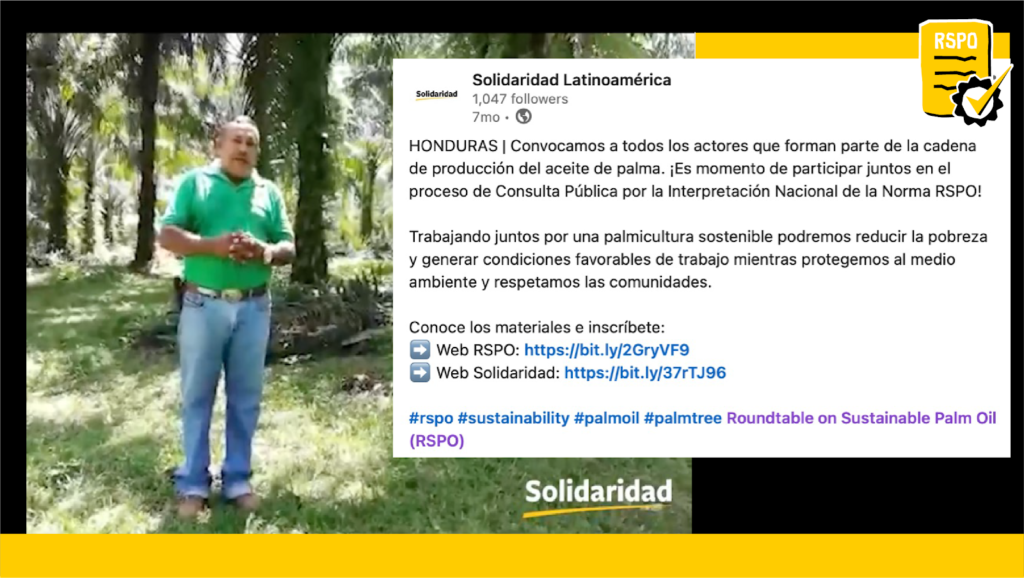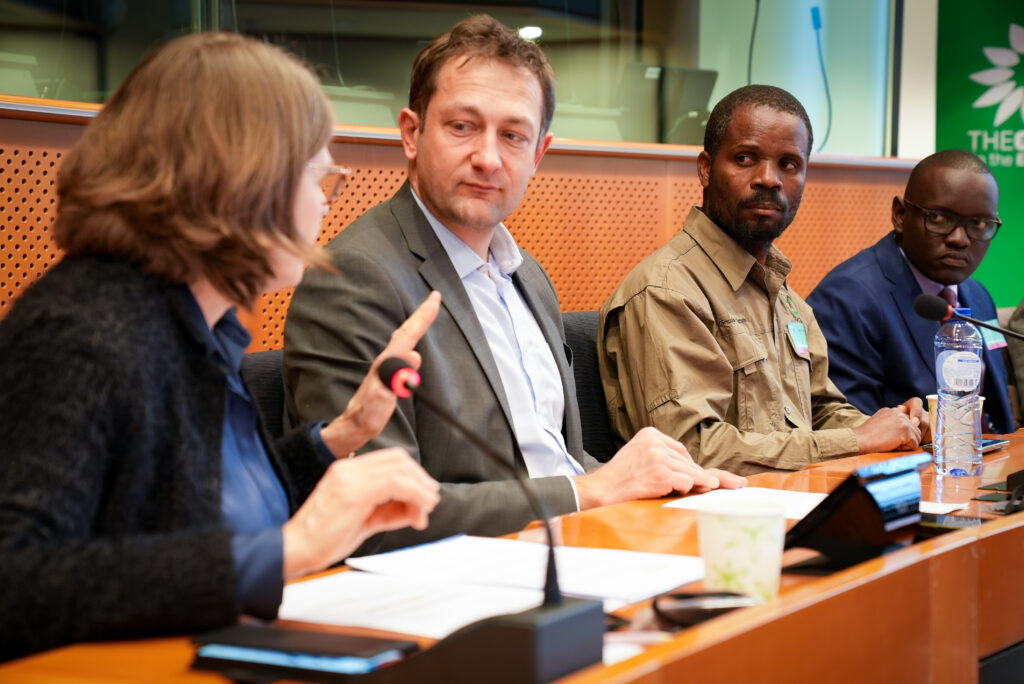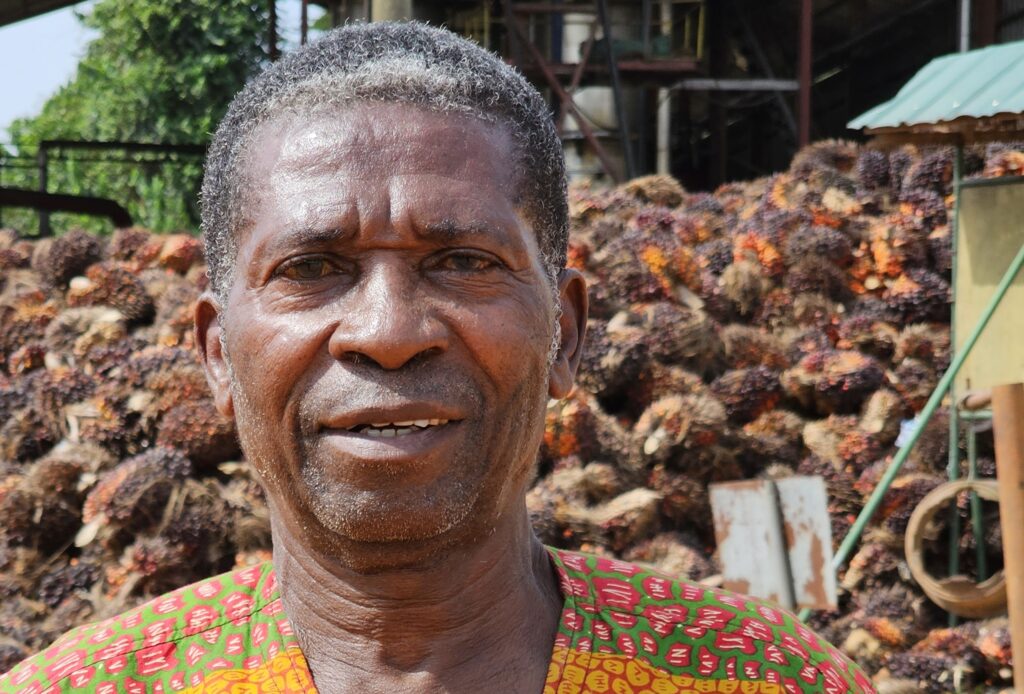Solidaridad led the Technical Secretariat that facilitated the process through working groups that met virtually in 2020 and 2021. The national interpretation of the RSPO standard (Roundtable on Sustainable Palm Oil) is a process that promotes social justice and transparency for all actors in the palm production chain. Through dialogue, a multi-stakeholder group analyzed the guides that will serve as guidance in the implementation of good practices for each indicator of the RSPO Principles and Criteria 2018.
“This is an important moment for Guatemala… for the oil palm producing sector in our country. It has been a process of much construction and relationship,” said Karen Rosales of the palm growers union and president of the National Work Group.
Currently, 64% of the total production volume in Guatemala is certified under standards such as RSPO and ISCC. The country is recognized as a leader in oil productivity per hectare.

“In Honduras, palm cultivation is of great economic and social importance: it contributes 3.8% to GDP and the majority is produced by more than 16,000 small producers, who depend on this income for their daily livelihoods,” said Flavio Linares, Head of Technical Programmes for Solidaridad in the region.
National working groups in Honduras and Guatemala celebrate the approval
At meetings convened by Solidaridad on June 23, each National Working Group met virtually to celebrate this achievement, which involved a multi-stage process. In both countries, there was a great participation of diverse actors of the different interest groups that, through participatory dialogue, took on the challenge of carrying out the national interpretation.
“This process resulted in solid long-term relationships and ongoing dialogue. I recognize that even in Covid times and despite all the circumstances, we have managed to have a successful, participatory and inclusive process,” continued Karen, who, on behalf of the National Working Group in Guatemala, thanked the RSPO, the sub-group facilitators and the Solidaridad team.
Francisco Naranjo, Director for RSPO Latin America, also congratulated and thanked the different actors for an entirely successful process that brought important achievements and gains for the sector in both countries.
Mauricio Gómez, president of the National Working Group in Honduras, attributed the successful completion of the process to the perseverance and desire of each group member. “I want to thank each of the groups. Each one had representatives [from multiple sectors] and invited experts who provided important contributions to this national interpretation process.”
A public consultation to incorporate multiple perspectives
The national interpretation process in Guatemala, Honduras and Nicaragua required a 60-day public consultation to engage different stakeholders from various sectors. The public consultation allowed to effectively meet the objectives of the national interpretation:
- Align the generic 2018 RSPO Principles and Criteria (P&C) to the legal and regulatory framework of each country
- Share the P&C of the 2018 standard, fostering discussion on the main sustainability issues in each country
- Provide guidance to producers, auditors, civil society and other stakeholders on the implementation of the RSPO 2018 P&C
- Prepare and improve the definitions and guides within the P&C RSPO 2018 pertinent to the legal framework of each country

Solidaridad created messages and shared them along with videos or graphics to encourage members and stakeholders from the various public, private and civil society sectors to join to participate in the Public Consultation process. For example, the above LinkedIn post says, “Working together for a sustainable palm cultivation we will be able to reduce poverty and generate favorable working conditions while protecting the environment and respecting the communities.” In addition, the RSPO published announcements on its website to encourage stakeholder participation.
The Public Consultation in Nicaragua concluded in early September and received approval from the RSPO Board of Governors in November 2021. Francisco Naranjo, Head of RSPO Latin America, congratulated all working group members:
On behalf of the entire LatAm RSPO team, I want to express our sincere congratulations and gratitude for the work done during the National Interpretation process, which undoubtedly contributes to promoting sustainable palm oil production in Nicaragua…. This achievement further commits the RSPO team to continue working in a coordinated manner with the objective of having a more sustainable palm cultivation in the region.
Francisco Naranjo, Head of RSPO Latin America
For more information
If you have questions about our work with the RSPO standard in Central America, please contact Flavio Linares who is also the director of the Technical Secretariat of the National Interpretation processes in Guatemala, Honduras and Nicaragua.













